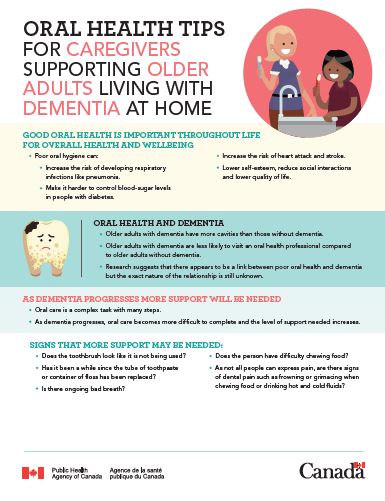Oral health tips for caregivers supporting older adults living with dementia at home

Download the alternative format
(PDF format, 145 KB, 2 pages)
Organization: Public Health Agency of Canada
ISBN: 978-0-660-32148-6
Pub.: 190274
Date published: 2019-09-10
Related Topics
Good oral health is important throughout life for overall health and well being
Poor oral hygiene can:
- Increase the risk of developing respiratory infections like pneumonia
- Make it harder to control blood-sugar levels in people with diabetes
- Increase the risk of heart attack and stroke
- Lower self-esteem, reduce social interactions and lower quality of life
Oral health and dementia
- Older adults with dementia have more cavities than those without dementia
- Older adults with dementia are less likely to visit an oral health professional compared to older adults without dementia
- Research suggests that there may be a link between poor oral health and dementia but the exact nature of the relationship is still unknown
As dementia progresses, more support will be needed
- Oral care is a complex task with many steps
- As dementia progresses, oral care becomes more difficult to complete and the level of support needed increases
Signs that more support may be needed
- Does the toothbrush look like it is not being used
- Has it been a while since the tube of toothpaste or container of floss has been replaced
- Is there ongoing bad breath
- Does the person have difficulty chewing food
- As not all people can express pain, are there signs of dental pain such as frowning or grimacing when chewing food or drinking hot and cold fluids
As a caregiver, how to support an older adult living with dementia
- Recognize that assisting or directly providing oral care to an older adult living with dementia is not an easy task and it may be uncomfortable.
- Be prepared for some resistance when assisting or directly providing oral care. Further information on tips for communicating with a person with dementia.
- Start by finding routines that are familiar to the older adult living with dementia and identify routines you are both comfortable with-such as brushing teeth together, in the same place and at the same time of day.
- As dementia progresses, some individuals may have trouble identifying their oral care tools. Consider labeling them in a way that is easy to identify (for example, name, colors, placing dental tools and supplies in familiar places).
- Be prepared to provide reminders and prompts to help orient the older adult living with dementia that it is time to complete their oral care.
- More tips for caregivers can be found at:
Partnering with an oral health professional
- Try to book appointments with an oral health professional who is familiar to the older adult living with dementia, especially in the later stages of the condition.
- Inform the oral health professional of a dementia diagnosis, even in the early stages, so that informed and appropriate treatment decisions can be made.
- Work with the oral health professional to identify strategies that can help you to better provide support and care at home.